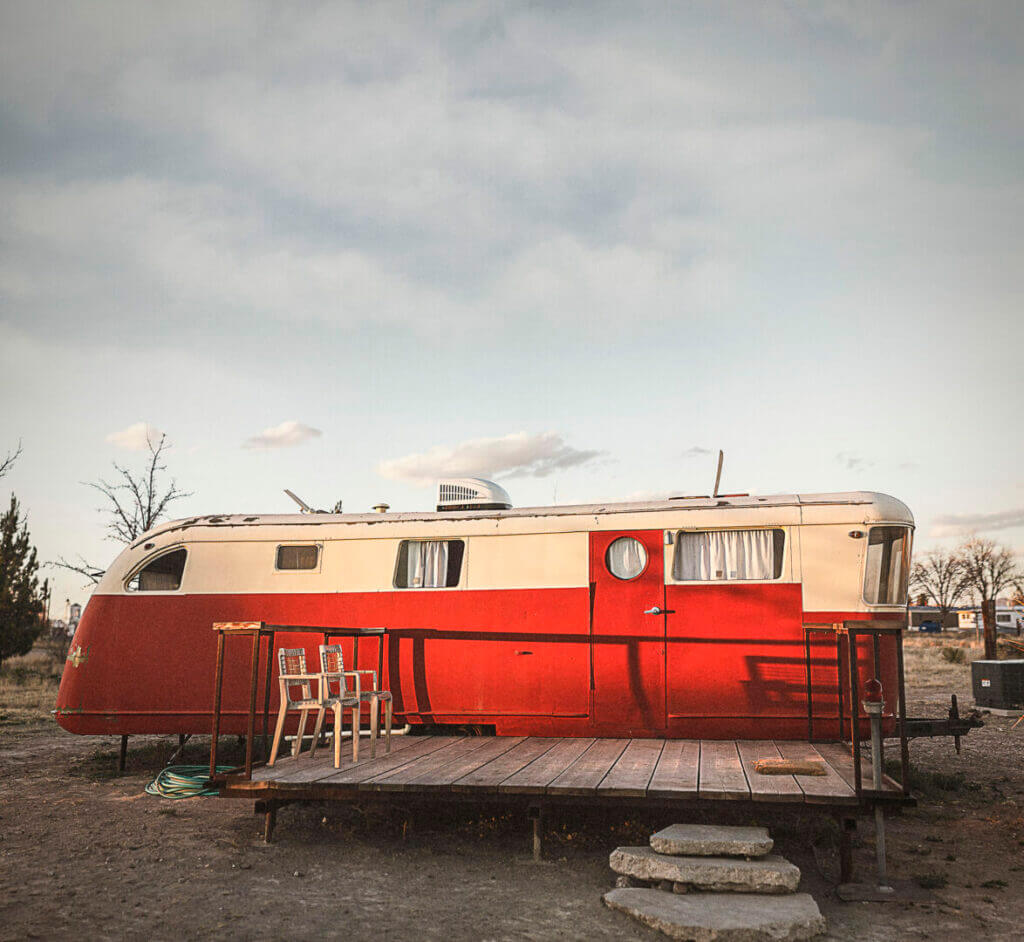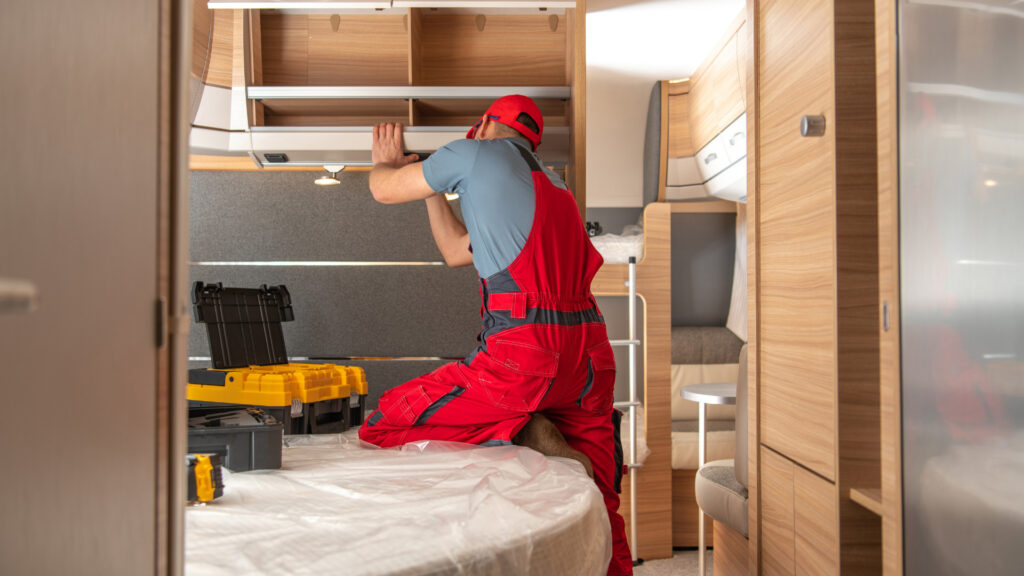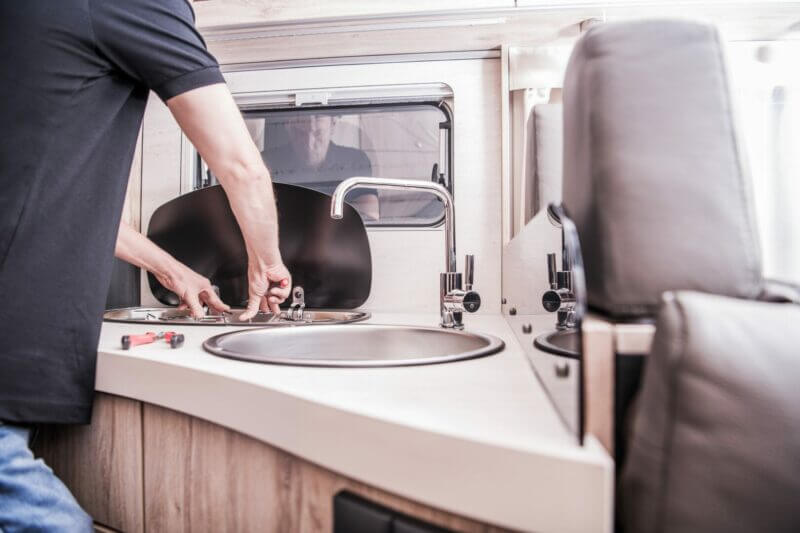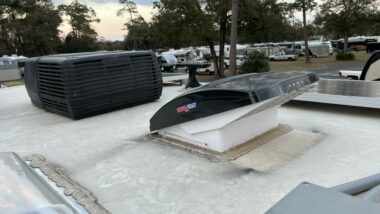Table of Contents Show
Have you ever thought about embarking on a new project but were hesitant because you might have possible RV renovation regrets? By the end of this article, we hope you’ll have gained some insight and perspective into potential issues you might encounter during a project of this magnitude.
We’ve compiled a list of ten different factors to consider before you begin working. Any successful renovation project requires a tremendous amount of planning, preparation, and perseverance. The likelihood that you’ll escape any venture like this without a problem is virtually impossible.
Now, let’s get this list rolling, so you can decide whether or not this is a venture you wish to embrace before you start demolition.
Considering RV Renovation? Consider These Regrets First!
We’re sharing the experience of Shelly, a mom and amateur DIYer with a YouTube channel called Shelly Fixes Up a Camper. She approached the renovation of her first RV, a 2001 Thor California Tahoe Lite, as a learning experience. It took her three months working primarily during her toddler’s allotted nap and bedtimes.
We’ll intertwine some of Shelly’s experiences and regrets with some of our own reno regrets. We’ll share a few reasons to reconsider renovating your RV and how these lessons might influence your next project.
1. Painting with Brushes and Rollers Instead of Spraying
Paint is one of the most considerable improvements you can make during an RV renovation. Whether you’re painting just the walls or the entire camper interior, paint is a relatively inexpensive upgrade that can make a massive impact.
Shelly believes it took her three months to complete this project because she chose to use brushes and rollers instead of spraying. She also says she only devoted an hour here and there for painting, thus extending the project even longer. Had she used a sprayer and taped everything off beforehand, she could have completed that part of the project within a few days.
Keep in mind that she primarily painted during nap times, so a few days for her are just a few hours.
2. Getting a Camper That’s Too Old
There are obvious pros and cons to choosing an old camper. Often, the construction of older RVs is solid and dependable. They might need decor updates or minor repairs, but if the previous owners kept up on maintenance and repairs, it could last you for many years to come!
Shelly explains that choosing to renovate an older camper has its disadvantages, and that’s something to keep in mind. She found numerous things to replace in the RV due to normal wear and tear.
She noted that choosing a camper that’s five or ten years old as opposed to 15 or 20 years old can sometimes prevent the frequency of repair and replacement along the way.

3. Painting Lower Areas and Baseboards Too Light
Although Shelly says she would paint the inside of the camper all white again, she does regret painting the lower parts and baseboards white also. The foot traffic in her rig, particularly around the dinette area, leaves many scuffs that she must clean regularly.
As an alternative, Shelly said she would choose a more neutral color next time, maybe something similar to the color of the floor–not a bad idea to help hide dirt and scuff marks.
4. Not Replacing Furniture
In an older camper, the decor often matches the year it was built. The older the trailer is, the more vintage and outdated the furniture and accessories will be. Shelly said she used a high-quality, attractive couch cover initially but ultimately decided to replace the entire couch. She could have saved time and money by simply replacing the sofa, to begin with.
Furniture has a much shorter shelf life than the structure of your RV, so swapping out items like sofas and beds early on will save you the hassle and cleaning bills. It’s not as hard as you’d think to find a couch that will comfortably fit the small space in your RV for only a few hundred dollars. Many of today’s modern and stylish designs are equally functional and affordable.
To avoid even more RV renovation regrets, you might consider replacing furniture with something more suitable for your family’s needs. For example, a U-shaped dining area can feel cramped and confined for more than two people, so it’s not uncommon for people to install a table and chairs instead.
5. Underestimating Time and Cost
Have you ever planned a project and estimated the length of time necessary to complete it, only to discover halfway through that you completely misjudged it? Or, maybe you tried to compile an approximate budget for your project, but your estimate was far higher or lower?
It can be challenging to precisely predict the time and resources you’ll need for a project. As a general rule for both time and expense, estimate high. Of course, it may take longer or more money to complete, but wouldn’t it be nice if it came out on the lower end of the predicted budget?
6. Not Doing a Thorough Inspection Beforehand
Thoroughly inspecting a camper before purchase is vital for several reasons, and it’s certainly not something you want on your list of RV renovation regrets.
First, uncovering problems and asking the seller questions will help you estimate the scope of work. Shelly recalls a few areas of water damage that she discovered after purchase. She believes she could have detected it before if she’d been more diligent in the inspection.
In Shelly’s case, her spare time is limited, and during the initial meeting with the seller, she brought her toddler to tour and check out the camper. The distraction restricted her focus, so she encourages others to attend the meeting solo (or with a partner who’s sharing the expense). That way, you can have all of your concerns and questions addressed appropriately before you sign the bill of sale.

7. Underestimating the Amount of Prep Work
Guesstimating the amount of prep work necessary to complete your renovation project can be tricky, especially if it’s your first large project. It can be challenging to know exactly how much time and materials you’ll need to organize before you can begin.
We find it helpful to write a detailed, step-by-step plan of what you anticipate and wish to accomplish. Include relevant factors to your projects, such as time, money, and supplies, while leaving room in each category for error and delay.
8. Living in the RV During Renovations
There are advantages and disadvantages to choosing to live in your RV during your renovation project.
One advantage is being on-site for your demolition and construction. If something goes wrong or malfunctions, you can take immediate action. This choice can provide peace of mind and help limit further damage.
A clear disadvantage is not having access to your whole RV. For example, if you renovate the bathroom first, you’ll need a backup plan to use the facilities. This might limit where you can camp and how far you can travel during your repairs and upgrades.
In truth, most people put living in their RV while making updates at the top of the RV renovation regrets list!
9. Not Having the Right Tools
When you don’t have the proper tools for your project, it can be frustrating and delay your progress. Therefore, we reiterate our suggestion about adequately preparing.
We suggest making all necessary tools easily accessible at your work site. Keep in mind that you might have to rent or buy tools, and they might be heavy enough that you can’t travel with them.
You might think you can save money by making do with the tools you have. For example, you can make any cuts you need with a circular saw, but getting precise cuts is hugely time-consuming and challenging.
Shelley’s story about using rollers and brushes rather than a paint sprayer is another example of this. If she had simply rented or bought a paint sprayer from the start, she could have had her project done weeks or months earlier!
It’s worth getting the tools that will make the job easier. Each job will have more precise results, and it will save you significant time (and likely money) in the long run.

10. Having a Short Timeline to Finish
Anytime you approach a project with limited time, your anxiety and stress level can often amplify the experience. For example, if you buy an RV you plan to renovate two months before the big road trip you’ve been planning all year, your stress levels will be through the roof as you try to get it ready in time.
A short timeline can sometimes lead to unnecessary mistakes, mishaps, and errors. Ultimately the more time you can allocate yourself, the better for you and the project outcome. For example, giving yourself six months to a year to renovate your RV will be much more realistic for most busy families.
Plan Ahead for Your RV Renovation!
RVs allow people of all walks of life to mingle and explore in a comfortable setting. Many of today’s campers are self-contained and, as a result, continue to gain popularity among travelers from all over the world.
Ultimately, a DIY RV renovation can be hugely fulfilling and worthwhile. We just don’t want you to underestimate what it might take out of you. Approaching a renovation project can be a huge undertaking that will require significant time, money, and stamina.
We wish you all the best in your next project and hope this list helps you avoid many of our and Shelley’s RV renovation regrets!






